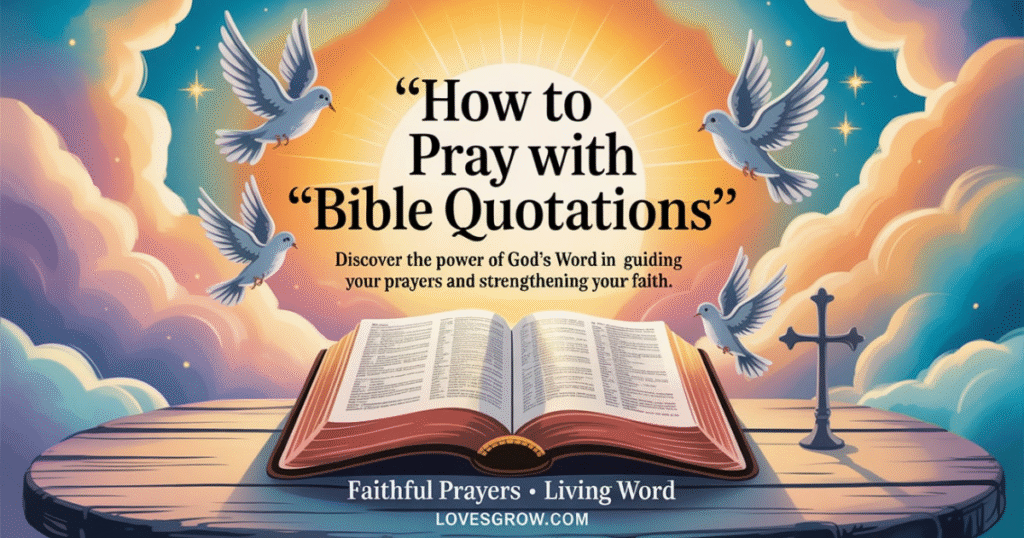Prayer is more than reciting words, it’s interaction with God, alignment with His will, and standing on His promises. When you infuse prayer with Bible quotations, you build confidence in your petitions because you base them on God’s revealed Word. This guide offers you structured prayer points across key life areas, personal growth, relationships, health, finances, spiritual warfare and adds special topics often missed by others. You’ll also find “People Also Ask” style question answers, designed for SEO and real user needs.
What Are Some Powerful Prayer Points?
Powerful prayer points are not vague pleas; they are specific declarations rooted in Scripture, shaped by God’s promises, and prayed with faith and expectancy. They go beyond “God bless me” and instead say, “God, according to Your Word, do this.”
For example, you might pray, “Lord, as You said in Isaiah 40:31, renew my strength. Let me soar on wings like eagles, not grow weary.” Or, “Father, You promised in Psalm 91:11 that You’ll command Your angels to guard me so I ask now for angelic protection over my life.”
These are powerful because they aren’t solely our words, they are God’s own words turned into prayer, anchoring our faith in His unchanging promises.
What Are the 7 Ps of Prayer?
To help you pray with structure and fullness, many believers use the 7 Ps of prayer, a framework that ensures your prayers cover worship, confession, request, faith, and spiritual strength. These are:
- Praise – Begin by exalting God’s greatness, attributes, and goodness (e.g. “Lord, You are holy, You are sovereign, You are my refuge”).
- Purity – Confess sins, ask for forgiveness, and beg that your heart be cleansed (1 John 1:9).
- Promises – Declare Scripture promises you stand on (e.g., God will provide, protect, heal).
- Petition – Present your requests and needs, big or small.
- Persistence – Continue in prayer even when answers seem delayed (Luke 18:1).
- Patience – Wait on God’s timing, trusting He answers best at the right moment.
- Power – Pray in the Spirit, invoking God’s strength and authority, not your own.
Using the 7 Ps helps you avoid shallow or disjointed prayer. It deeply roots your conversation with God in worship, confession, promise, and spiritual authority.
How to Pray With Bible Quotations

Incorporating Scripture into your prayers is not just quoting verses—it’s making God’s Word your voice in prayer. Here’s how to do it:
- Select a relevant Scripture
Choose a verse related to your situation: healing, guidance, protection, provision. - Read it, meditate, and internalize
Don’t just recite and understand its context and meaning. - Personalize the verse as prayer
Turn the verse into “Your Word says therefore Lord, I declare …” For example, from James 1:5: “Your Word says if I lack wisdom I should ask you to give generously so Father, I ask now for wisdom without reproach.” - Declare it in faith and expectancy
When you pray it, believe God will respond. Speak it as your confession. - Repeat and reinforce
Return to that Scripture often, praying it again when doubts or fears press.
This method is powerful because Scripture becomes your intercessor. You pray not for your flesh, but God’s own promises.
What Is the Prayer Point From Isaiah 6?

The vision in Isaiah chapter 6 centers on holiness and God’s call: “Holy, holy, holy… the whole earth is full of His glory.” When Isaiah sees God, he confesses his impurity and then hears, “Whom shall I send? And who will go for us?” The theme is purification and commissioning.
So a key prayer derived from Isaiah 6 might be:
“Lord, purify me by Your holiness, refine me with Your fire, and send me out as Your instrument.”
This addresses an inner readiness to serve God, humility to accept His cleansing, and desire to fulfill His purpose. Few articles include this, but it gives spiritual depth beyond surface petitions.
Prayer Themes Across Life Areas
ALSO MUST READ THIS: Messages for Birthday Wishes: Heartfelt, Unique, and Meaningful Expressions

Below is a rich set of Scripture-based prayers across your spiritual life. Use them as springboards to add your name, your situation, your faith.
Personal Growth & Character Development
Pray for transformation of character: humility, compassion, patience, integrity. Ask God not just to bless you, but to change you from inside.
“Father, cultivate in me a humble and contrite heart. As You said in Micah 6:8, You desire justice, love mercy, and walk humbly. Help me live that out.”
Or pray for growth through trials:
“Lord, in times of trial I lean on Your promise in Romans 5:3–4 that suffering produces perseverance and character. Strengthen me in this season.”
Family & Relationships
Your home, children, spouse, even broken relationships need God’s touch.
“God of peace, I ask for unity in my family. Your Word says where two or three are gathered in Your name, You are present. Bring reconciliation, love, grace.”
For healing relationships:
“Lord, reconcile what is broken, heal bitterness, restore trust. Let love abound as in 1 Corinthians 13.”
Career & Work
Work is part of God’s domain too. Pray for purpose, favor, excellence.
“Father, bless the work of my hands. As You commanded in Colossians 3:23, let me work as for You, not for men. Let promotion and favor rest upon me in Your name.”
When pressure mounts:
“Lord, fill me with wisdom to navigate challenges. Your Word says You give wisdom liberally to all who ask (James 1:5). I claim that now.”
Health & Well-being
Health is holistic physical, mental, emotional, spiritual.
“Jehovah Rapha, You heal. Your Word says make the sick whole and bind up wounds (Jeremiah 30:17). I ask for healing over my body, and peace of mind over my spirit.”
During anxiety:
“Father, Philippians 4:6–7 says I should not be anxious but pray with thanksgiving. I bring my worries to You and ask You to guard my heart and mind with peace beyond understanding.”
Finances & Provision
Prayer for provision is not greed, it is trust.
“Lord, according to Philippians 4:19, You will supply all my needs. I stand on that promise now. Open doors of provision, and give me wisdom to steward it.”
To ease anxiety:
“You command us not to worry. I let go of financial fear and trust in Your abundance and care.”
Spiritual Warfare & Protection
This area demands boldness. Many miss it or treat it weakly.
“Lord, clothe me in Your full armor that I may withstand the schemes of the enemy (Ephesians 6:11). Break chains of generational curses over my lineage. Let Your protection surround me.”
“I resist every scheme of the enemy. I claim victory in Christ. I pray for deliverance and freedom.”
Special Prayers (Often Missed)
- Morning & Evening Prayers: Start and close your day with God’s Word.
- Prayers for Nation & Leaders: Intercede for your country—its leaders, law, peace (1 Timothy 2:1–2).
- Gratitude / Thanksgiving: Give thanks in every situation (1 Thessalonians 5:18).
- Travel & Safety: Ask for angelic escort and safe passage.
- Spiritual Revival & Awakening: Pray for awakening in churches, communities, within yourself.
- Occasional Prayers: For weddings, new year, birthdays, transitions.
- End Times Readiness: Pray for faith to stand firm in trials preceding Christ’s return.
Conclusion
When you pray with Bible quotations, you switch from asking in your own strength to speaking aligned with God’s revealed truth. You invoke His promises, fight with His authority, and pray with a confident heart. Whether for personal growth, relationships, finances, health, or spiritual warfare, let each prayer you speak be rooted in Scripture.
Take this guide, make it yours—add your stories, your voice, your struggles, your victories. Let it be more than text: let it become your living prayer manual. Pray often. Pray boldly. And watch as God answers in ways that exceed your imagination.
FAQs
What are the three important points to prayer?
The three important points to prayer are praise, petition, and persistence.
- Praise means starting your prayer by honoring God’s greatness, holiness, and goodness (Psalm 100:4).
- Petition refers to bringing your needs, desires, and concerns before Him with faith (Philippians 4:6).
- Persistence highlights consistency—continuing in prayer even when answers are delayed (Luke 18:1).
Together, these three remind us that prayer is worship, request, and ongoing fellowship with God.
What are the five points of prayer?
The five traditional points of prayer are adoration, confession, thanksgiving, petition, and intercession.
- Adoration – expressing love and reverence for God.
- Confession – admitting sins and asking forgiveness (1 John 1:9).
- Thanksgiving – showing gratitude for God’s blessings (1 Thessalonians 5:18).
- Petition – asking for personal needs and guidance.
- Intercession – praying on behalf of others, including family, community, and nations (1 Timothy 2:1).
This model ensures balance, so your prayer life isn’t only about asking, but also about worship, gratitude, and concern for others.
What are the 7 points of the Lord’s Prayer?
The Lord’s Prayer (Matthew 6:9–13) contains seven key themes:
- Hallowed be Thy name – honoring God’s holiness.
- Thy kingdom come – longing for God’s rule in our lives and the world.
- Thy will be done – submitting to His divine plan.
- Give us this day our daily bread – asking for daily provision.
- Forgive us our debts – seeking forgiveness for sins.
- Lead us not into temptation – praying for protection against sin.
- Deliver us from evil – asking for God’s defense from the enemy.
These points serve as a complete blueprint for how Christians should approach prayer—covering worship, surrender, provision, forgiveness, guidance, and protection.
What are the 4 elements of prayer?
The four core elements of prayer, often summarized as ACTS, are:
- Adoration – worshiping God for who He is.
- Confession – acknowledging and repenting from sin.
- Thanksgiving – appreciating God’s blessings.
- Supplication – making requests, both personal and for others.
This model keeps prayer balanced and holistic, making sure we connect with God on multiple levels rather than focusing only on needs.
What are the 5 Ps of prayer?
The 5 Ps provide a practical structure for believers:
- Praise – Begin with worship and gratitude.
- Purity – Seek forgiveness and cleansing of heart.
- Promise – Stand on God’s Word as assurance.
- Petition – Present requests with faith.
- Persistence – Keep praying until God answers.
This framework emphasizes that prayer is not only about asking but also about aligning with God’s promises and remaining steadfast.
What are the 7 principles of effective prayer?
Effective prayer involves more than words—it’s about heart, faith, and alignment with God. The seven principles are:
- Praise – always begin by exalting God (Psalm 34:1).
- Confession – clear your heart of sin so nothing blocks your prayer (Psalm 66:18).
- Aligning with God’s will – pray in agreement with His Word (1 John 5:14).
- Faith – believe that God hears and will answer (Mark 11:24).
- Perseverance – don’t give up when answers delay (Luke 18:1).
- Humility – approach God with a dependent heart (James 4:6).
- Sincerity – be genuine, not repetitive or mechanical (Matthew 6:7).
These principles ensure your prayer life is spiritually rich, impactful, and biblically grounded.
What are the prayer points from Psalm 35?
In Psalm 35, David prays that God would defend him, turn back the enemy’s plans, grant him joy, vindication, and restore his reputation.
What does Colossians 3:17 say about prayer?
“Whatever you do, in word or deed, do everything in the name of the Lord Jesus” — so prayers (and all our actions) should be conducted in Jesus’ name.
What is a simple but powerful prayer?
“Father, I trust You. Guide me, protect me, provide for me. Let your will be done in my life.”
What are the most powerful prayers in the Bible?
Aaron’s Priestly Blessing (Numbers 6:24–26), the Psalms (Psalm 23, 91, 51), Hannah’s prayer for a child, and Jesus’ High Priestly Prayer in John 17. Open the Bible
